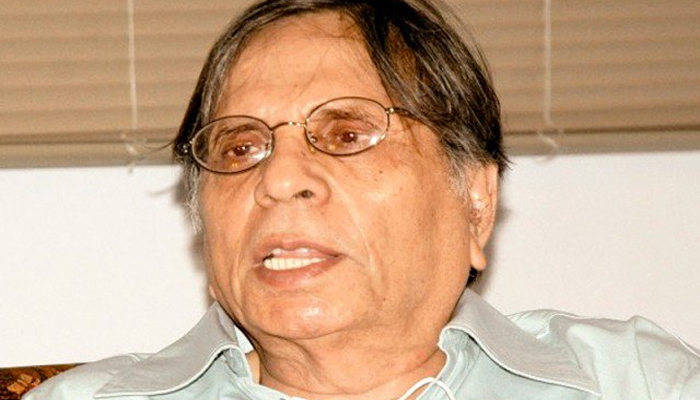Work on Arab conquest needed before it’s too late: Dr Mubarak Ali
With the passage of time an eminent part of our history related to the subjugation of Sindh has faded away. There is dust settling in the footsteps of Muhammad bin Qasim and his contribution towards Sindh’s conquest, making it extremely obscure.
The fact that relative sufficient work needs to be carried out cannot be shunned, and this single fact is stressed by historians and academicians time and again.
Considered as the historian who has repeatedly shed light on the bias and prejudice our history books, particularly the textbooks, suffer from, Dr Mubarak Ali is a remarkable historian, activist and scholar to be interviewed in this regard.
He has spent most of his life reading, researching and writing about the history of Pakistan and that of pre-partition subcontinent.
It was hence no less than a privilege to interview him.
Dr Mubarak Ali proceeded to dispel many misconceptions related to Muhammad bin Qasim’s campaign to conquer Sindh.
In general he appeared to be sceptical of the concepts that we have internalised since our childhood, the popular beliefs about Bin Qasim’s invasion, and the location of Deybul or Aror. Following are some excerpts of the interview.
Are Banbhore and Deybul two different names of the same place? Is it actually the place where Muhammad bin Qasim started his campaign from? Or is Deybul a site near Manora, as some believe?
Dr Mubarak Ali: From whatever we could gather from history, the notion about Deybul and Banbhore being the same place is highly debatable and unconfirmed. Since no actual places have been preserved relating to the birth of Islam in Sindh, we cannot really say for a fact that Deybul is actually present-day Banbhore. Deybul’s exact location is nowhere to be found in history.
Is it true that a place near Sukkur and Rohri is the ancient city of Aror, since Muhammad bin Qasim’s mosque was discovered there?
Dr Mubarak: Again this is a matter of great concern. Similar to the mosque at Aror, there was another one found in Sanghar and people have attributed it to Muhammad bin Qasim in some way as well. However, I do not believe or can say for sure that the (ancient) city near Rohri is in fact Aror. So it is difficult to establish its existence with complete surety.
Is it true that the Malabar Coast boasted mosques before the commencement of Muhammad bin Qasim’s campaign to seize Sindh? Can it be asserted that Islam existed in this region before Muhammad bin Qasim came to Sindh?
Dr Mubarak: Islam only came to Sindh after Muhammad bin Qasim arrived here. Although it was military and not religious interest that brought him here, Islam did not exist in the region prior to Muhammad bin Qasim’s venture.
Why Muhammad bin Qasim is known as the man responsible for Islam’s birth in Sindh?
Dr Mubarak: (Quotes “Chachnama”) There is a huge fallacy behind the generic statement that Muhammad bin Qasim brought Islam to Sindh. The general did not come to spread Islam, but attacked Sindh with the intention of avenging the Hindu act of looting Muslim trade ships. Thenceforth Islam did not come because of Muhammad bin Qasim. While it did gain popularity after Sindh was conquered by him, it came because of a few lesser known reasons.
Back in 712 AD, Sindh was a tribal area with the Alafi tribe in power. When Muhammad bin Qasim defeated the Hindus, the Sardar in Sindh at that time embraced Islam. This was followed by a mass conversion of people after their ruler had a change of faith. This is why the Alafis in Sindh are regarded as one of the early converts to Islam.
A lot has been said and written about Muhammad bin Qasim and his achievements. Why haven’t historical places like Banbhore and Aror been properly identified and preserved?
Dr Mubarak: As mentioned earlier, this part of our history is replete with wrong beliefs and has been curated on the basis of highly dubious facts. We do not actually know the places linked to Muhammad bin Qasim. It is thus a very difficult task to trace history, which is why little to no preservations have been undertaken so far. However, it is highly essential to do so before it is too late.
Lastly, what do you have to say about the standard of history courses and textbooks in our country?
Dr Mubarak: The state of history in school and college-level books is very weak. The way we have looked at history since years is not only wrong but biased too. We also face a deficit of intellectually sound historians which is why the standard of education imparted under the subject of history is not satisfactory at all.
Turning out to be a great sceptic of what we have learnt from childhood about the advent of Islam in Sindh, Dr Mubarak reiterated the need for digging out facts and truth related to Muhammad bin Qasim. In this short interview, there was one thing that I learnt for sure: one should always be critical of what information is given to him/her and question it in order to probe deeper into reality.
-
Security forces gun down 30 terrorists in multiple IBOs in KP: ISPR
-
MQM-P calls for new province in Sindh
-
US report validates Pakistan military edge over India: PM
-
Banned TTP poses serious threat to Pakistan security: UNSC panel
-
CM Afridi clarifies remarks on by-poll after ECP requests army deployment
-
Dubai sees 3.2m Pakistani passengers in 2025 as airport sets new milestone
-
Security forces kill 23 Indian proxy terrorists in KP's Kurram
-
Pakistan to construct island to boost oil exploration: report












